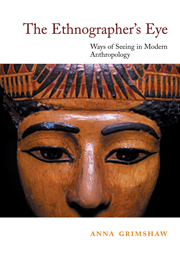Book contents
- Frontmatter
- Contents
- Preface
- Acknowledgements
- Introduction
- Part I Visualizing anthropology
- Part II Anthropological visions
- 5 Cinema and anthropology in the postwar world
- 6 The anthropological cinema of Jean Rouch
- 7 The anthropological cinema of David and Judith MacDougall
- 8 The anthropological television of Melissa Llewelyn-Davies
- Epilogue
- Notes
- Index
6 - The anthropological cinema of Jean Rouch
Published online by Cambridge University Press: 05 June 2012
- Frontmatter
- Contents
- Preface
- Acknowledgements
- Introduction
- Part I Visualizing anthropology
- Part II Anthropological visions
- 5 Cinema and anthropology in the postwar world
- 6 The anthropological cinema of Jean Rouch
- 7 The anthropological cinema of David and Judith MacDougall
- 8 The anthropological television of Melissa Llewelyn-Davies
- Epilogue
- Notes
- Index
Summary
The poet makes himself a seer by a long, prodigious and reasoned disordering of all the senses.
RimbaudLes Maîtres Fous was first screened in Paris in 1955. The small audience of French anthropologists and African intellectuals invited to the film's premiere at the Musée de l'Homme was largely hostile in its response to Jean Rouch's work. Marcel Griaule called for the film to be destroyed; Africans present at the screening denounced it as offensive and racist. Shortly afterwards the British government moved to prevent it from being shown in the colonial territories of West Africa. Now, forty years later, Les Maîtres Fous, is widely acknowledged as a classic of modern cinema; its impact, the film's power to move and unsettle audiences, has not been diminished by the passage of time.
In this chapter, I will examine the distinctive character of Jean Rouch's anthropological cinema. The question of vision as method and metaphor is central to this task. For Rouch, like David and Judith MacDougall (the focus of the next case study), is deeply committed to an ‘ocularcentric’ project. Vision is elevated as the noblest of the senses, and it is privileged as a source of knowledge about the world. But, as we will discover, Rouch's conception of anthropological cinema is markedly different from that developed by the MacDougalls.
- Type
- Chapter
- Information
- The Ethnographer's EyeWays of Seeing in Anthropology, pp. 90 - 120Publisher: Cambridge University PressPrint publication year: 2001
- 1
- Cited by



